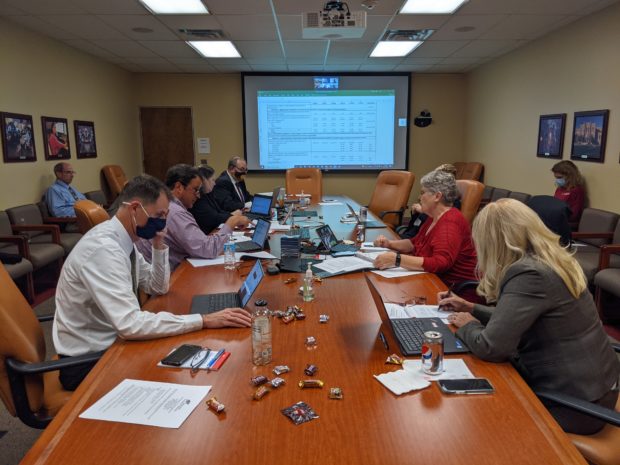
The State Board of Education Thursday approved a new fee structure for the state’s colleges and universities, which would let students opt out of a fee for student clubs and activities.
The change will go into effect for 2022-23. Students who opt out of the student club fee will receive a refund from their college or university.
The State Board started looking at student fees after this legislative session in response to “intent language” embedded in the bitterly debated higher education spending package. The language directs Idaho’s colleges and universities to make an easy-to-find explanation of student fees on their websites, to use common language for the fees from school to school, and evaluate if fees supporting clubs or organizations “focused on individual beliefs and values” could be restructured to give students more affordability and choice.
The intent language followed months of infighting about whether to cut colleges’ budgets over concerns they use taxpayer dollars to pursue what critics call a “social justice” agenda. Rep. Julie Yamamoto, R-Caldwell, also attempted to pass a bill that would allow students to opt out of fees that didn’t apply to them, and specifically pointed out costs for a diversity and inclusion center, club sports and minority student programs. Her bill never made it out of committee.
At the State Board’s direction, a working group of university officials met through the spring and summer to look at which student fees could be optional, and what to call them. The new board-approved fee structure has four categories, and would let students opt out of part of one fee:
- Student enrollment, engagement and success fee: Pays for services available to all students including scholarships and student employment opportunities.
- Institutional operations, services and support fee: Pays for things like construction and maintenance, and student involvement with athletic and cultural events.
- Student health and wellness fee: Pays for access to counseling centers, fitness facilities, and more.
- Student government fee: Supports student government. Students can opt out of a subset of this fee used to pay for student activities, clubs and organizations.
The board didn’t discuss how much money a student might save by opting out of a fee.
The State Board approved the fee reorganization with little conversation. Board member David Hill thanked the schools for tackling the subject.
“I think we should just recognize that the institutions really did a lot of work here,” Hill said. “They embraced this challenge and took it on in a very positive way. We would be remiss in not thanking them.”
State Board quickly approves Boise State police contract
Board members OK’d a new five-year contract between Boise State University and the Boise Police Department, finalized earlier this month. The school will spend about $10.5 million on the police contract, which requires the parties to work together. (Read more about that here.)
The contract was approved as part of the board’s consent agenda, meaning it didn’t get much discussion. But President Kurt Liebich took a moment to correct what he called misinformation about the contract, which clouded the renewal debate. The Idaho Freedom Foundation and some legislators erroneously said that BSU was not going to renew the police contract, “after consulting with student activists.”
“One of the rumors that was out there during the last legislative session was that Boise State (had the desire) to cancel their contract with the Boise Police Department,” Liebich said. “That was not the intent of Boise State. It never was.”
Board contemplates moving away from 60% goal
In a work session Wednesday, board members continued to sketch out a plan for ditching Idaho’s 60% goal in favor of higher-education performance measures that can be more directly influenced by colleges and universities.
This isn’t a new thought. The State Board almost scrapped the goal in February. They seem poised to do it later this year or early next year.
Since 2010, Idaho leaders have said they want 60% of 25-34 year-olds to hold a college degree or professional certificate. But board members, in February and on Wednesday, questioned whether it makes sense to “hold ourselves accountable for something we can’t control,” Board member Kurt Liebich said, or whether the board should instead adopt degree-production targets.
The board didn’t make any hard and fast decisions Wednesday, but asked colleges and universities to provide some proposed degree-production targets that the body could consider adopting instead. The idea will come up for more concrete discussion at the State Board’s December meeting.
Board approves ISU degree for teaching deaf and hard-of-hearing students
The State Board approved a novel online program at Idaho State University, expected to equip four to 10 individuals a year with a graduate certificate in listening and spoken language, to teach students who are deaf and hard of hearing.
“There is a shortage nationally for educators who can serve children who are deaf or hard of hearing,” ISU professor Kristina Blaiser told the board. Only seven programs across the country offer this kind of certificate, she said.
Aspiring Idaho educators are not the immediate target. Blaiser was approached by officials with the state of Minnesota to create the program to help professionals get certified in that state. Though it will start nationally, ISU officials said they anticipate the program can serve students in Idaho and across the country in coming years.
Brian Darcy, an administrator with Idaho Educational Services for the Deaf and Blind, told board members that he hasn’t been able to hire certified teachers out of school, instead relying on grow-your-own programs.
“All I can say is… we need teachers,” Darcy said. “I’ve got two positions right now that I haven’t had anybody qualified to fill.”
Correction: An earlier version of this story incorrectly referred to board member David Hill as Tim Hill.
